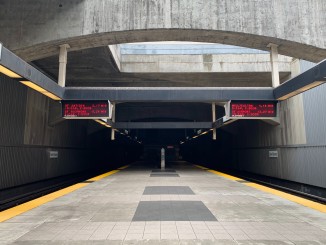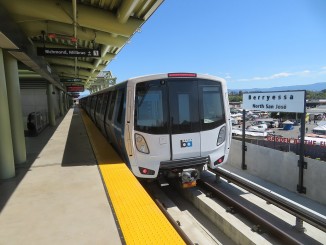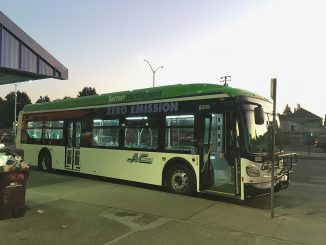The key components to any public transit system are well-maintained buses or trains, convenient scheduling, affordable fees for passengers (or free), a well-trained and regular workforce. All of this is under attack. As people struggle to make ends meet, the fares are out of reach of many, and lines are being cut. And the people who do the work at AC Transit, BART, and MUNI are under attack, which is forcing out experienced drivers and making it difficult for workers to provide the level of service they want to and that is expected of them. These attacks can’t be allowed to continue.
Overview of AC Transit
Workers
- 1,148 bus drivers (down from 1,224 in ‘09-10)
- 410 Maintenance, Staff and Clerical workers (down from 487 in ‘09-11)
Riders (the third largest bus system in California)
- 200,000 riders per day
- ParaTransit: 711,00 riders per year
Cuts to Riders
- AC Transit is at its lowest service levels in years. In 2010 there were two cuts in bus service: 7.8 percent cut in March and another 7.2 percent cut in October. This meant that bus lines and frequency of service were cut by 15 percent in one year!
- There are cuts being proposed in South Bay lines for later in the year.
Working Conditions
- Drivers do their best to maintain the schedules despite traffic jams, police actions, assisting disabled passengers, passengers with carriages, bicycles etc. And the pressure to keep on schedule can mean that some riders are sometimes left waiting.
- Drivers do not have regular break rooms for lunch or restroom facilities. Drivers often miss breaks because they are running behind schedule. Not having access to break rooms means that drivers can be denied a restroom for hours because none are available.
- Driving all day and breathing exhaust fumes makes driving a bus among the most unhealthy occupations.
- When buses are off schedule, riders often see the driver as the only person to vent their anger against.
Cuts to Workers
- The current contract expires June 30 of this year and management wants more takeaways from workers. In the last two contracts, drivers, mechanics, service and clerical workers have taken big cuts. Management wants to continue this in the coming contract.
The last contract was imposed by a state arbitrator:
- Workers paid more for health benefits (instead of AC Transit covering the full amount). This meant a six percent wage cut the first year of the contract and a three percent this last year.
- Veterans Day was cut as a paid holiday
- There were no wage increases or COLA (Cost of Living Allowances). Workers’ wages have fallen behind the rise of the cost of living in the Bay Area
- Attack on retirement – AC Transit’s contribution to retirement was cut from $1.30 an hour to 65¢ an hour.
Overview of BART
Workers
- 393 Train Operators
- 304 Station Agents
- 1,626 Maintenance, Staff and Clerical
Riders
- 390,000 riders a day
Cuts to Riders
- A roundtrip ticket from Pittsburg/Bay Point to San Francisco is $12.
- Fare increases are scheduled on the first day of even-numbered years until 2020, which will push the average fare to $4.25.
- BART plans to eliminate the free parking left at seven stations. All stations will charge at least $1 for parking.
- By August, nine stations will increase their parking fees by fifty cents – MacArthur station will cost $5.50 a day.
Working Conditions
- Station agents and other staff are assaulted on a regular basis.
- Train operators face frequent mechanical failure, which can cause accidents.
Cuts to Workers
- During their last contract (2009), BART management tried to turn the public against the workers. BART spokesperson, Lynton Johnson, even encouraged the public to harass station agents.
- In the end, BART unions gave up $100 million in concessions in the form of healthcare cuts, no wage increases for four years and cost cutting labor rules that limited working hours.
The Contract Showdown
The AC Transit and BART bosses have stated their intentions to attack workers’ wages and benefits and working conditions, and riders with possible fee increases and service cuts in the upcoming contract. A showdown is definitely coming.
- Major cuts to workers’ retirement have already been declared:
- PEPRA (the Public Employees Pension Reform Act) imposed by the Brown administration, if management forces this on the workers:
- Workers will have to pay 50% of pension costs, which means 6.75% of their wages.
- Workers will be forced to work years longer and still won’t get the benefits they have now. This can mean a big cut to retirement.
- Wages counting toward retirement will no longer include overtime or unused vacation. So, workers’ retirement will be falling behind the cost of living. That’s why retirement based on overtime is especially important.
- This will hit new employees first and will include all workers after five years.
Will there be a strike?
That is up to whether management insists on imposing further cuts to workers and riders. But either way, we have to be prepared. AC Transit and BART workers need to build links in order to organize together to face what seems to be coming. And workers can’t ignore the impact of scheduling and line cuts and fare increase on passengers. Since a showdown is coming, this should be a joint fight for safe and accessible transit systems. We are all in this together!
Overview of MUNI
Workers
- 2,200 drivers
- 2,500 maintenance, staff, and clerical workers
Riders
- 250,000 passengers per day.
Cuts to Riders
- MUNI cost $1.00 to ride from 1992 to 2005.
- Since then, MUNI fares have doubled to $2.00.
- In 2010, MUNI service was reduced by ten percent due to state and federal spending cuts.
Working Conditions
- Drivers regularly work through their breaks and skip lunches to keep to the schedule.
- Drivers have to pay $80 per month in order to park in MUNI parking lots.
- Drivers are forced to use inadequate public restrooms and are forced to work for hours without bathroom breaks.
- Drivers develop chronic health conditions including high blood pressure, knee and shoulder problems, kidney and bladder problems.
- Drivers are blamed for accidents and equipment failures.
Cuts to Workers
- In 2010 the union contract for MUNI drivers expired. Management drew up a new set of proposals which forced drivers to pay more for pensions, and reduced break time and the margin of error for driving on schedule. The union never accepted this contract so drivers are currently working without an official contract.
- In 2009, San Francisco politicians put Proposition G on the ballot, attacking MUNI drivers’ wages, previously protected in the SF city charter.
- Management is currently forcing a summer schedule on drivers, reducing runs to eight hours, forcing drivers to meet impossible schedules. MUNI drivers will have even less of a chance to take any breaks. And the cut in hours amounts to a pay cut of up to $1000 per month.




